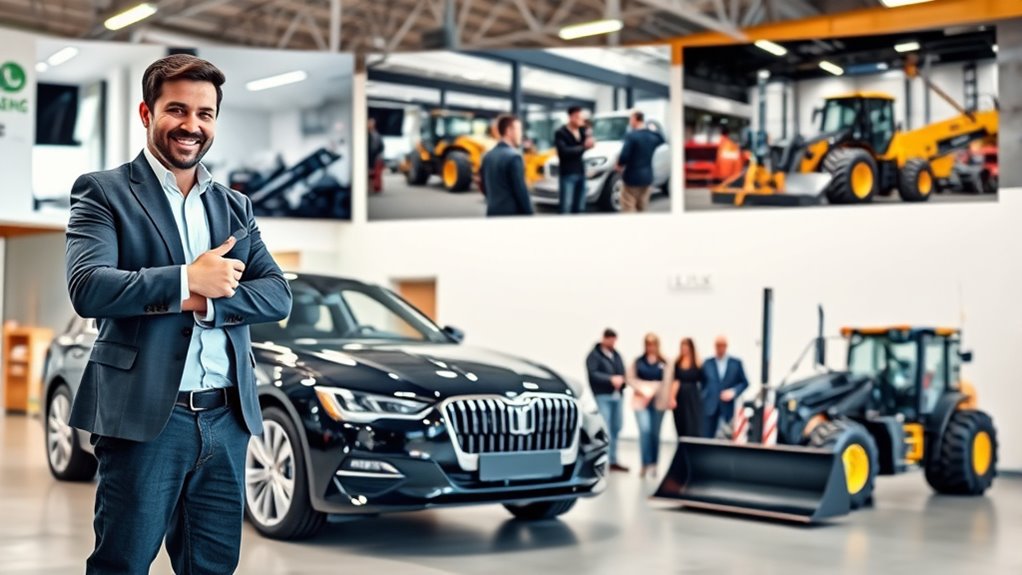If you plan to keep your vehicle for many years, buying is the smarter choice because you’ll build equity and avoid ongoing lease restrictions. If you want to customize or modify your car freely, ownership offers unmatched control. For high-mileage drivers or those seeking long-term savings, buying reduces costs over time. Plus, if you’re looking for tax benefits or flexibility, purchasing can provide advantages early on. Keep going to discover more scenarios where buying beats leasing and how to recognize them early.
Key Takeaways
- Planning to keep the vehicle for many years maximizes the value of ownership over leasing costs.
- If you want to customize or modify your car freely, ownership provides unrestricted control.
- High-mileage drivers benefit financially from ownership, as lease limits and penalties become restrictive.
- When you seek long-term tax benefits like depreciation and interest deductions, buying offers clearer advantages.
- If avoiding ongoing payments and having full control are priorities, purchasing is the better option early on.

While leasing can seem appealing for its lower monthly payments, there are key scenarios where buying a vehicle is the smarter choice. If you plan to keep the car for the long haul or want to maximize your financial benefits, purchasing often makes better sense. One major advantage is the potential for tax benefits, especially if you use the vehicle for business purposes. When you buy, you may be able to deduct depreciation, interest on your auto loan, or other related expenses, depending on your local laws. Leasing, on the other hand, typically offers limited tax advantages, mainly because you’re paying for the use of the vehicle rather than ownership. If you’re a small business owner or have a side gig that involves driving, buying could considerably reduce your tax burden over time, making it a more economical choice. Additionally, owning your vehicle provides a sense of security and control that leasing cannot match, especially in terms of vehicle customization options.
Another important factor to contemplate is customization options. When you own a vehicle, you have the freedom to modify or personalize it to suit your preferences. Want to install a custom sound system, upgrade the wheels, or get a specific paint job? Buying allows you to do whatever you want without restrictions. Leasing, however, generally comes with strict guidelines about vehicle modifications, and you could face penalties or charges if you alter the car. If customization is important to you, especially for personal use or hobby projects, owning the vehicle from the start ensures you’re not limited by lease clauses or additional costs.
Furthermore, buying makes sense if you see yourself driving the same car for many years. Leasing typically involves a set period—usually two to three years—and you’ll need to return the vehicle or lease a new one when the term ends. If you’re the type of driver who values long-term stability and wants to build equity in your vehicle, buying allows you to keep the car for as long as it remains reliable. Once the loan is paid off, you own the vehicle outright and no longer have monthly payments, which can save you money in the long run. Plus, when you decide to sell or trade it in, you might recoup some of your initial investment, something leasing never offers.
Frequently Asked Questions
What Credit Score Is Needed to Buy Versus Lease?
When deciding to buy or lease, you should consider your credit requirements, which can influence your financing options. Typically, a good credit score for buying is around 700 or higher, giving you access to better loan terms. For leasing, lenders may accept scores around 650, but higher scores often lead to more favorable deals. Keep in mind, your credit score impacts your ability to secure financing, whether buying or leasing.
How Does Resale Value Influence the Decision to Buy?
Resale value considerably influences your decision to buy because higher resale value means you’ll recoup more when you sell. Keep an eye on depreciation rates; vehicles with lower rates retain value longer. If the resale value is strong, buying can be more cost-effective in the long run. On the other hand, if depreciation is steep, leasing might be better to avoid losing too much value over time.
Are There Tax Advantages to Leasing or Buying?
When deciding between leasing and buying, you should consider tax advantages like tax incentives and depreciation benefits. Buying often offers depreciation benefits, allowing you to deduct the asset’s value over time, which can reduce your taxable income. Leasing might provide immediate tax deductions on lease payments. Your choice depends on your financial situation, but understanding these tax perks helps you make a smarter decision.
What Maintenance Costs Are Associated With Buying?
When you buy a vehicle, you’re responsible for maintenance costs, which include potential repairs outside warranty coverage, and increased insurance premiums due to the vehicle’s value. You’ll need to budget for regular upkeep, such as oil changes and tire replacements, plus unexpected repairs. Keep in mind, warranty coverage can reduce some costs initially, but once it expires, you’ll bear all maintenance expenses, making it essential to plan for these ongoing costs.
How Does Future Market Value Impact Leasing Decisions?
You might think future market value doesn’t matter, but it actually impacts your leasing decisions considerably. If a vehicle’s market depreciation is steep, leasing incentives become more attractive because the residual value drops, lowering monthly payments. Conversely, if the vehicle holds its value well, buying might be better. Investigating these trends helps you decide whether to lease or buy, optimizing costs based on anticipated market fluctuations.
Conclusion
So, next time you feel tempted to lease, remember these scenarios where buying actually wins. Ironically, the very situations that seem to favor leasing—like short-term needs—might just be the perfect reasons to buy instead. Turns out, what looks like a quick fix can turn into a smart long-term move. So go ahead, make the purchase—sometimes, the best way to stay ahead is to actually own it. Who knew?










